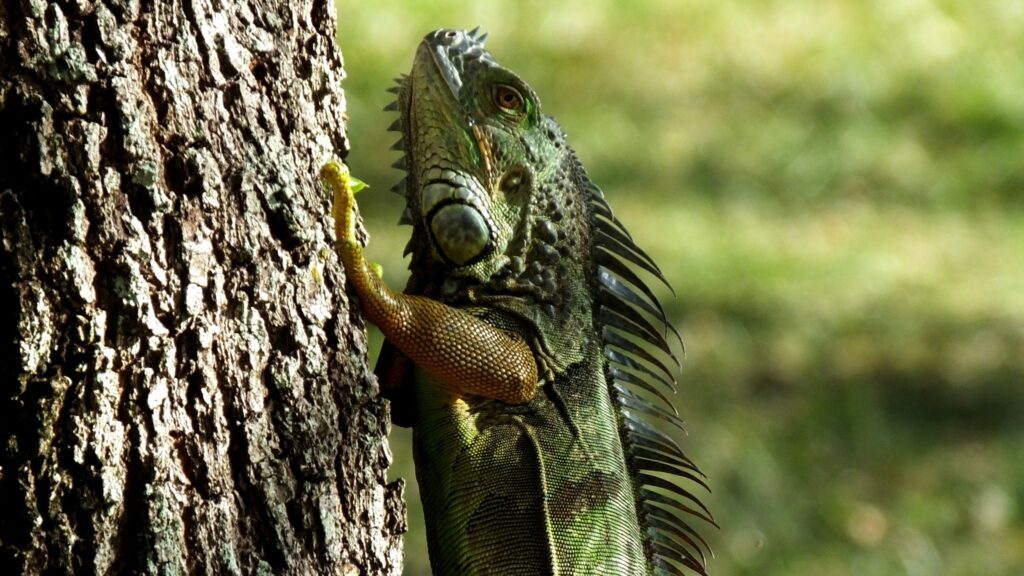Introduction
If you’ve ever seen Iguanas chances are you were around tropical and subtropical regions. These cold-blooded creatures thrive in warm environments, making Florida’s climate ideal for their survival. However, when temperatures drop, iguanas face significant challenges that can impact their health and behavior. Here, we will go over how weather affects iguanas, particularly focusing on at what temperature do iguanas die and how to manage iguana issues during cold weather.
Impact of Cold Weather on Iguanas
Cold weather can have a dramatic effect on iguanas. When temperatures fall below a certain threshold, typically around 50 degrees Fahrenheit, iguanas become immobile and can even fall from trees, an event often seen during unexpected cold snaps. This is because iguanas rely on external heat sources to regulate their body temperature. When the environment gets too cold, their bodily functions slow down, leading to a temporary state of paralysis known as cold-stunning.
During these periods, you might witness iguanas falling out of trees, which can be alarming. The cold-stunned iguanas appear lifeless, but they are not dead. As temperatures rise, they usually recover and resume their normal activities.
A report from CNN highlighted an incident in Miami where cold weather caused a significant number of iguanas to fall from trees. This crazy event underscores the impact of unexpected temperature drops on these reptiles.
At What Temperature Do Iguanas Die?
Understanding at what temperature do iguanas die is crucial for managing their population and ensuring their well-being. Generally, iguanas become cold-stunned at temperatures below 50 degrees Fahrenheit. Prolonged exposure to temperatures below 45 degrees Fahrenheit can be fatal. It’s important to note that while iguanas and cold weather are not typically a fatal combination, extreme cold can lead to death if the iguanas are unable to find warmer conditions quickly, as echoed in the research from Phys.org.
Another study highlighted by Science News points out that climate change could affect the cold tolerance of iguanas, potentially leading to more frequent incidents of falling iguanas as weather patterns become more erratic.
Preventing Iguana Issues During Cold Weather
To mitigate the issues caused by cold weather, it is essential to understand the temperature that iguanas fall out of trees and take proactive measures. Homeowners and property managers in areas prone to cold snaps can take steps to protect their property from damage caused by falling iguanas. This includes securing outdoor areas where iguanas are likely to perch and ensuring that any fallen iguanas are handled humanely.
For those dealing with iguana infestations, Iguana Busters offers safe and humane removal services. By scheduling a free estimate or guided iguana hunt, you can manage the iguana population on your property effectively and ethically.
According to the Florida Fish and Wildlife Conservation Commission (FWC), green iguanas (most common in Florida) are considered an invasive species and are not protected except by anti-cruelty laws. This highlights the need for professional removal services, such as those provided by Iguana Busters to handle these reptiles appropriately.
Frequently Asked Questions
Cold-stunning is a state of temporary paralysis that occurs in iguanas when temperatures drop below their tolerance level, typically around 50 degrees Fahrenheit.
Yes, prolonged exposure to temperatures below 45 degrees Fahrenheit can be fatal to iguanas.
Securing outdoor areas and regularly inspecting for iguana activity can help mitigate the risks of falling iguanas during cold weather.
Conclusion
Cold weather poses significant challenges for iguanas, leading to phenomena like iguanas falling out of trees and, in extreme cases, death. Understanding at what temperature do iguanas die is crucial for managing these reptiles effectively. If you’re facing issues with iguanas, consider reaching out to Iguana Busters for safe and humane removal services. By doing so, you can protect your property and contribute to the well-being of Florida’s ecosystem, plus, we provide FREE estimates with insights for your issues.


